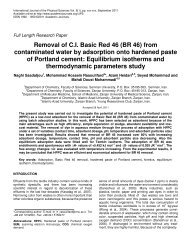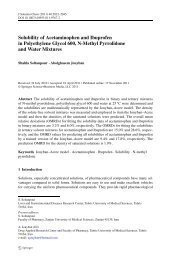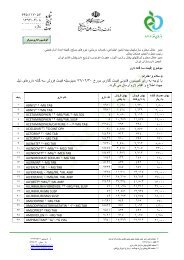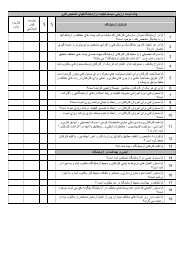new insights into the prevention and treatment of bulimia nervosa
new insights into the prevention and treatment of bulimia nervosa
new insights into the prevention and treatment of bulimia nervosa
You also want an ePaper? Increase the reach of your titles
YUMPU automatically turns print PDFs into web optimized ePapers that Google loves.
Application <strong>of</strong> Psychodrama <strong>and</strong> Object Relations Psycho<strong>the</strong>rapy – An Integrated<br />
Approach to <strong>the</strong> Treatment <strong>of</strong> Bulimia Nervosa Based on Selected Elements <strong>of</strong> <strong>the</strong> Theory …<br />
with parents, who “cast” her in <strong>the</strong> role <strong>of</strong> “a responsible child”. The anger is directed<br />
mainly towards <strong>the</strong> mo<strong>the</strong>r, who <strong>the</strong> person, as a child, was trying to protect against<br />
experiencing negative emotions.<br />
2. Playing <strong>the</strong> role <strong>of</strong> “a good child”, causing no troubles, <strong>the</strong>reby meeting expectations set<br />
by parents who encourage <strong>the</strong> desired behaviour <strong>and</strong> reward <strong>the</strong> child for it. This<br />
gradually hinders <strong>the</strong> child’s ability to express alternative feelings <strong>and</strong> pursue<br />
behaviours which <strong>the</strong>ir parents regard as “bad=wrong” <strong>and</strong> “needy”. The child feels he<br />
or she is a disappointment to <strong>the</strong> parents. A child lives, as it were, in <strong>the</strong> world which is<br />
merely “good” or “bad”, <strong>and</strong> this bipolar view <strong>of</strong> <strong>the</strong> world affects his or her selfperception.<br />
As a result, <strong>the</strong> child denies <strong>the</strong> “bad”, “needy” aspect <strong>of</strong> his ore her<br />
personality to gain his or her parents’ approval. In this respect, <strong>bulimia</strong> <strong>nervosa</strong> can<br />
serve as a means <strong>of</strong> externalizing (e.g. through eating) <strong>and</strong> denying undesirable aspects<br />
<strong>of</strong> personality. However, despite <strong>the</strong> fact that eating is considered to be an “external<br />
activity”, it has a direct impact on <strong>the</strong> feelings <strong>and</strong> emotions which bulimic individuals<br />
have towards <strong>the</strong>mselves. When a bulimic has a good day, because she or he has eaten<br />
only “good” food, <strong>the</strong> individual feels good. Such a condition lasts until <strong>the</strong> <strong>bulimia</strong><br />
suffer decides to consume “bad” food, which results in reversing <strong>the</strong> process <strong>of</strong> selfevaluation.<br />
It proves that self-assessment is influenced by external factors. When talking<br />
to my female patients suffering from <strong>bulimia</strong> <strong>nervosa</strong>, I notice that <strong>the</strong>y <strong>of</strong>ten use such<br />
expressions as: “I should” or “I shouldn’t”. The need for approval, which goes h<strong>and</strong> in<br />
h<strong>and</strong> with failure to comply with self-set st<strong>and</strong>ards, makes it difficult for <strong>bulimia</strong><br />
sufferers to establish social relationships. When selecting partners, bulimics oscillate<br />
between individuals who need to be taken care <strong>of</strong> <strong>and</strong> those who need to take care <strong>of</strong><br />
o<strong>the</strong>rs. Due to <strong>the</strong>ir low self-esteem <strong>bulimia</strong> sufferers find it difficult to acknowledge<br />
that <strong>the</strong>ir partners perceive <strong>the</strong>m as attractive. The fact that bulimic individuals<br />
disapprove <strong>of</strong> <strong>and</strong> reject <strong>the</strong>ir own bodies triggers problems in <strong>the</strong> sexual sphere.<br />
Alcohol <strong>and</strong> drug abuse turns out to be a common coping strategy.<br />
Recent scientific research demonstrates that <strong>the</strong> pathomechanisms underlying eating<br />
disorders, particularly <strong>bulimia</strong> <strong>nervosa</strong>, develop in response to such difficult life experiences<br />
as acts <strong>of</strong> violence or sexual abuse, which an individual is exposed to ei<strong>the</strong>r during<br />
childhood or adult life [Mikołajczyk, Samochowiec, Kent, Waller, Dagnan, Hartt,<br />
Wonderlich , Rorty, Bruch, Izydorczyk]<br />
A number <strong>of</strong> personality pr<strong>of</strong>ile studies conducted on <strong>bulimia</strong> sufferers prove that <strong>the</strong>y<br />
display <strong>the</strong> following personality disorders: borderline <strong>and</strong> histrionic personalities, impulse<br />
control disorders, impulsivity, or an obsessive-compulsive disorder. Bulimics tend to be<br />
quick-tempered, <strong>and</strong> have low frustration tolerance <strong>and</strong> frequent dysphoric moods. They<br />
also display a tendency to withdraw <strong>and</strong> to get depressed [Mikołaczyk, Samochowiec].<br />
Lacey <strong>and</strong> Evans defined <strong>the</strong> notion <strong>of</strong> a “Multi-Impulsive Personality Disorder” <strong>and</strong><br />
specified its characteristic behaviours (such as psychoactive substance abuse, repeated selfharm,<br />
compulsive dozing <strong>of</strong> substances, shoplifting <strong>and</strong> gambling), placing <strong>bulimia</strong> <strong>nervosa</strong><br />
among <strong>the</strong>m [Lacey, Evans]. Inadequate impulse control, present in bulimic patients, leads<br />
to regular episodes <strong>of</strong> binge eating, vomiting, using drugs, drinking alcohol, compulsive<br />
smoking, repeated self-harm <strong>and</strong> indulging in a variety <strong>of</strong> impulsive, tension-releasing<br />
behaviours. Such behaviours are frequently accompanied by <strong>the</strong> feelings <strong>of</strong> self-loathing <strong>and</strong><br />
disgust towards one’s own body, guilt <strong>and</strong> shame. By contrast with patients suffering from<br />
anorexia <strong>nervosa</strong>, who tend to deny <strong>the</strong>ir illness, bulimic individuals go through <strong>the</strong>ir illness<br />
15














![focuspdca.ppt [Compatibility Mode]](https://img.yumpu.com/22859457/1/190x146/focuspdcappt-compatibility-mode.jpg?quality=85)


